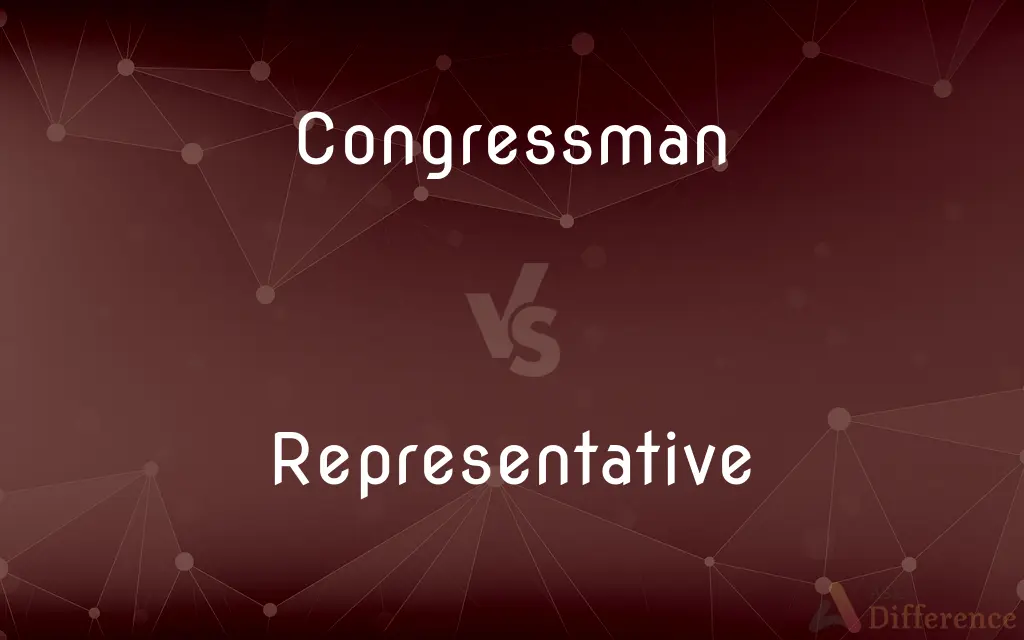Congressman vs. Representative — What's the Difference?
Edited by Tayyaba Rehman — By Urooj Arif — Updated on March 26, 2024
A Congressman is a member of the U.S. Congress, including both Senators and Representatives, while a Representative specifically serves in the House of Representatives.

Difference Between Congressman and Representative
Table of Contents
ADVERTISEMENT
Key Differences
In the United States, the term "Congressman" is often used broadly to refer to any member of the United States Congress, which encompasses both the Senate and the House of Representatives. It's a general designation that includes both Senators, who are elected to represent their entire state, and Representatives, who are elected to represent specific congressional districts within a state. On the other hand, a "Representative" refers exclusively to a member of the House of Representatives, highlighting their role in representing a smaller, more localized constituency.
The House of Representatives is one of the two chambers in Congress, designed to be closely aligned with the population, with its members serving two-year terms. Representatives, therefore, have a more direct connection to the immediate concerns and interests of their constituents, given their shorter term and the smaller geographic area they represent. Conversely, while the term "Congressman" can refer to someone in this chamber, it also applies to Senators, who serve six-year terms and represent their states at large, focusing on broader statewide or national issues.
Each state is guaranteed at least one Representative, with the total number of Representatives capped at 435, distributed according to population. Senators, however, are fixed at two per state, regardless of the state's population, totaling 100 Senators. This difference underscores the Representative's role in providing proportionate population representation, while the use of "Congressman" as an inclusive term does not specify this level of representation detail.
The distinction becomes particularly relevant in discussions about legislative processes or political representation, where the specific powers, responsibilities, and constituencies of Senators versus Representatives are under consideration. For example, only the House of Representatives has the power to initiate revenue bills, while the Senate has exclusive powers, such as consenting to treaties and confirming presidential appointments.
While "Congressman" is sometimes used interchangeably with "Representative" in casual conversation or media, the precision in terminology can be important for clarity, especially in legal, formal, or academic contexts. It ensures accurate communication regarding the roles, responsibilities, and scope of authority of these elected officials within the U.S. federal government's legislative branch.
ADVERTISEMENT
Comparison Chart
Chamber
Can be in either Senate or House of Representatives
Exclusively in the House of Representatives
Term Length
Senators: 6 years, Representatives: 2 years
2 years
Constituency
Senators: Entire state, Representatives: Congressional district
Congressional district only
Number per State
Senators: 2, Representatives: At least 1, varies by population
At least 1, varies by population
Legislative Powers
Shared powers, but with chamber-specific roles (e.g., impeachment, treaties)
Unique powers (e.g., initiate revenue bills)
Representation
Broad (statewide for Senators) or localized (for Representatives)
More direct and localized
Compare with Definitions
Congressman
Applies to any member of Congress.
The congressman addressed the national policy changes.
Representative
Serves a congressional district.
The representative held a town hall in her district.
Congressman
Includes both Senators and Representatives.
Congressmen from both chambers met to discuss the bill.
Representative
Seats allocated by population.
The state gained a representative due to population growth.
Congressman
Serves in the legislative branch.
As a congressman, he focused on healthcare reform.
Representative
Unique power of the chamber.
The representative introduced a bill to adjust taxes.
Congressman
Participates in federal lawmaking.
The congressman voted on the new federal budget.
Representative
Member of the House of Representatives.
The representative proposed a new education bill.
Congressman
Represents statewide or district interests.
The congressman advocated for his state's agricultural needs.
Representative
Shorter electoral term.
The representative campaigned for reelection after serving two years.
Congressman
A man who is a member of the US Congress, especially of the House of Representatives.
Representative
One that serves as an example or type for others of the same classification.
Congressman
A male member of congress.
Representative
One that serves as a delegate or agent for another.
Congressman
(US) A male member of the House of Representatives.
Representative
A member of a governmental body, usually legislative, chosen by popular vote.
Congressman
A member of the Congress of the United States, esp. of the House of Representatives.
Representative
A member of the US House of Representatives or of the lower house of a state legislature.
Congressman
A member of the United States House of Representatives
Representative
Representing, depicting, or portraying or able to do so.
Representative
Authorized to act as an official delegate or agent.
Representative
Of or characteristic of government by representation.
Representative
Like or typical of others of the same class.
Representative
Typical; having the same properties or interest as a larger group.
Representative
Representing, showing a likeness.
Are you sure this paper is representative of your child's writing?
The representative faculty of the human imagination
Representative
A delegate.
Representative
Someone who represents others as a member of a legislative or governing body.
She served four terms as representative of her local at the national union convention.
Representative
One who speaks for or acts on behalf of another in a particular (especially official) capacity.
I will send a representative to work out the details of the contract.
Representative
(legal) An heir.
Representative
Specifically, a member of the United States House of Representatives.
All representatives face re-election every two years.
Representative
A company agent who visits potential purchasers; a salesman.
Representative
Something standing for something else.
Representative
Something representing or standing for another; a symbol, an embodiment.
Representative
A member of a particular class.
Representative
A substitute or analogue.
Representative
Fitted to represent; exhibiting a similitude.
Representative
Bearing the character or power of another; acting for another or others; as, a council representative of the people.
Representative
Conducted by persons chosen to represent, or act as deputies for, the people; as, a representative government.
Representative
Serving or fitted to present the full characters of the type of a group; typical; as, a representative genus in a family.
Representative
Giving, or existing as, a transcript of what was originally presentative knowledge; as, representative faculties; representative knowledge. See Presentative, 3 and Represent, 8.
Representative
One who, or that which, represents (anything); that which exhibits a likeness or similitude.
A statute of Rumor, whispering an idiot in the ear, who was the representative of Credulity.
Difficulty must cumber this doctrine which supposes that the perfections of God are the representatives to us of whatever we perceive in the creatures.
Representative
An agent, deputy, or substitute, who supplies the place of another, or others, being invested with his or their authority.
Representative
One who represents, or stands in the place of, another.
Representative
A member of the lower or popular house in a State legislature, or in the national Congress.
Representative
That which presents the full character of the type of a group.
Representative
A person who represents others
Representative
An advocate who represents someone else's policy or purpose;
The meeting was attended by spokespersons for all the major organs of government
Representative
A member of the United States House of Representatives
Representative
An item of information that is representative of a type;
This patient provides a typical example of the syndrome
There is an example on page 10
Representative
Serving to represent or typify;
Representative moviegoers
A representative modern play
Representative
Standing for something else;
The bald eagle is representative of the United States
Representative
Being or characteristic of government by representation in which citizens exercise power through elected officers and representatives;
Representative government as defined by Abraham Lincoln is government of the people, by the people, for the people
Common Curiosities
Can a Senator be called a Congressman?
Yes, as the term "Congressman" can refer to any member of Congress, including Senators.
What distinguishes the roles of Senators and Representatives?
Their constituencies (statewide vs. district), term lengths (6 years vs. 2 years), and specific legislative powers and responsibilities.
What's the main difference between a Congressman and a Representative?
A Congressman can be either a Senator or a Representative, while a Representative specifically serves in the House of Representatives.
How are Representatives allocated among the states?
Based on population, as determined by the decennial census.
Why might someone use the term Congressman instead of Representative?
For broader reference to legislative members without specifying the chamber.
Do Congressmen have term limits?
Currently, there are no term limits for either Senators or Representatives in the U.S. Congress.
What role does a Congressman play in creating federal laws?
Congressmen, including both Senators and Representatives, propose, debate, amend, and vote on legislation to create federal laws.
Is the term Congressman gender-neutral?
Yes, it's used broadly for male and female members, though some prefer gender-neutral terms like "Congressperson" or simply "member of Congress."
How can constituents communicate with their Congressman?
Constituents can communicate with their Congressmen through email, phone calls, town hall meetings, and visits to their local or Capitol Hill offices.
Can Representatives become Senators?
Yes, Representatives can run for a Senate seat and become Senators if elected by their state's voters.
How often do Congressional elections occur?
Congressional elections occur every two years for Representatives and one-third of Senators.
Who has the power to impeach the president, Congressmen or Representatives?
The House of Representatives (thus, Representatives) has the power to impeach, while the Senate conducts the impeachment trial.
How does the committee system work in Congress?
Both Senators and Representatives serve on committees that specialize in specific areas of legislation, such as finance or foreign affairs, to manage and advance bills more efficiently.
What is the difference in representation between Senators and Representatives?
Senators represent their entire state's interests, while Representatives focus on the interests of their specific congressional district.
Are there any educational requirements to become a Congressman?
No, there are no specific educational requirements to run for Congress, though many have college degrees or higher.
Share Your Discovery

Previous Comparison
Democracy vs. Totalitarianism
Next Comparison
Pear vs. PeerAuthor Spotlight
Written by
Urooj ArifUrooj is a skilled content writer at Ask Difference, known for her exceptional ability to simplify complex topics into engaging and informative content. With a passion for research and a flair for clear, concise writing, she consistently delivers articles that resonate with our diverse audience.
Edited by
Tayyaba RehmanTayyaba Rehman is a distinguished writer, currently serving as a primary contributor to askdifference.com. As a researcher in semantics and etymology, Tayyaba's passion for the complexity of languages and their distinctions has found a perfect home on the platform. Tayyaba delves into the intricacies of language, distinguishing between commonly confused words and phrases, thereby providing clarity for readers worldwide.














































